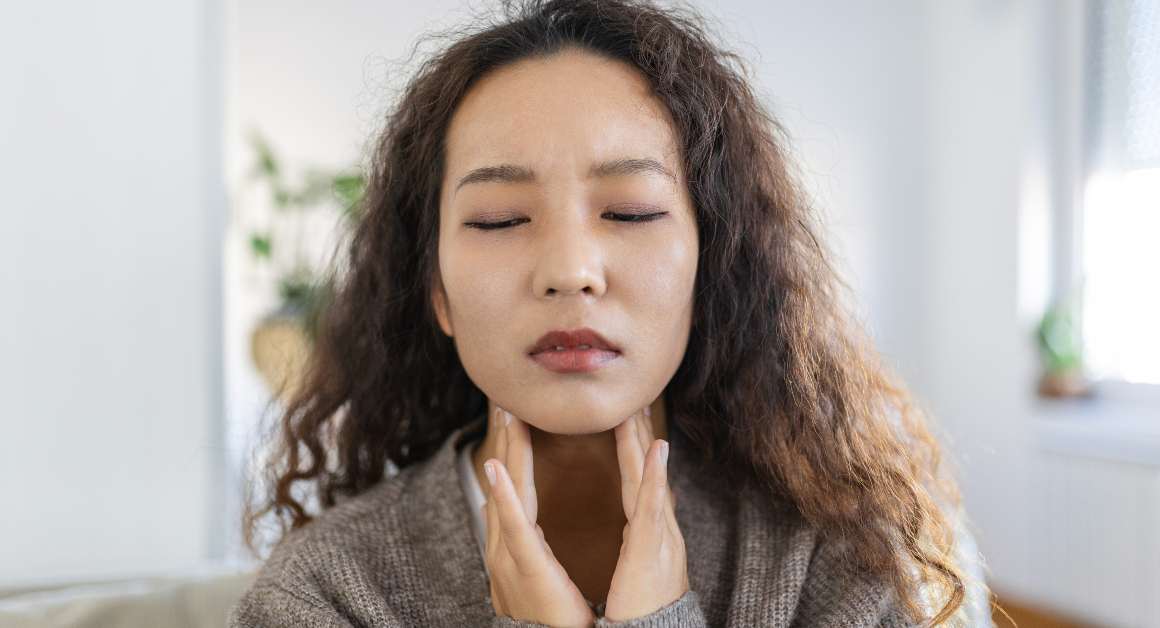Dry Throat: Causes, Remedies, and Prevention Tips
Last updated:
Published:
Experiencing a dry throat can be an uncomfortable and sometimes persistent issue. In this comprehensive blog post, we will delve into the various causes of dry throat, ranging from environmental factors to underlying medical conditions.
Contents:
- Common Causes of Dry Throat
- Environmental Factors Affecting Throat Dryness
- Dehydration and Its Impact on Throat Health
- Waking Up with a Dry Throat Every Day
- Persistent Dry Throat Despite Drinking Water
- Alleviating Symptoms of Dry Throat
- Preventing Dry Throat Occurrences
- Seeking Medical Help for Persistent Dry Throat
- FAQs in Relation to Dry Throat
For those who wake up with a dry throat every day, we will discuss potential culprits such as medications, nasal obstructions, and sleep apnea. Additionally, we will explore why some individuals may still have a persistently parched throat despite drinking plenty of water.
To help alleviate your symptoms throughout the day and prevent future occurrences of dry throat discomforts, we'll provide practical advice on addressing underlying issues and adjusting lifestyle choices. Furthermore, you'll discover effective home remedies for instant relief alongside preventive measures that promote optimal hydration levels.

Common Causes of Dry Throat
A dry throat can be caused by various factors, which may include environmental conditions, dehydration, allergies, mild respiratory infections, seasonal allergies, cigarette smoking, and upper respiratory infections. Physical health issues like acid reflux or tonsillitis may also contribute to the problem. In this section, we will discuss some common causes of a dry throat and how they affect your overall well-being.
Environmental Factors Affecting Throat Dryness
Dry air is one of the leading environmental factors that can cause a dry throat. This often occurs during winter months when indoor heating systems are in use. The heated air reduces humidity levels indoors, making it difficult for our bodies to maintain adequate moisture levels within nasal passages and throats, resulting in discomfort such as scratchy sensations or difficulty swallowing. Other environmental triggers like exposure to dust or pollen might also lead to an irritated throat due to allergic reactions.
Dehydration and Its Impact on Throat Health
Mild dehydration is another common cause of a dry mouth and throat. When our body lacks sufficient water intake, saliva production decreases, causing the mouth and throat to feel dry even after drinking fluids throughout the day. It's essential for individuals experiencing these symptoms to stay hydrated by consuming enough water regularly while avoiding beverages high in caffeine content since they could further exacerbate existing problems related to dehydration issues impacting overall quality of life on a daily basis.
Allergies Causing Irritation in the Throat
- Hay fever: Also known as allergic rhinitis, hay fever is characterized by inflammation of nasal passages due to allergens present in the environment such as pollen or dust mites. This condition often leads to symptoms like a runny nose, sneezing, and throat irritation.
- Seasonal allergies: Similar to hay fever, seasonal allergies are caused by exposure to specific allergens during certain times of the year (e.g., tree pollen in spring). These allergies can cause an itchy, scratchy throat along with other common allergy symptoms.
- Dust allergies: Dust mite allergens found within household environments might also trigger allergic reactions resulting in dry coughs, sore throats amongst affected individuals experiencing heightened sensitivity towards these particular substances leading to chronic conditions over time if left untreated and properly managed through appropriate measures taken to maintain healthy living spaces free of potential triggers contributing to overall discomfort experienced on a daily basis in life activities.
In order to alleviate and prevent dry throat occurrences, it's essential for individuals to identify the root causes underlying the issue and provide targeted effective solutions for long-term relief and management of this chronic condition impacting overall quality of life on a daily basis. Stay tuned for our next section where we will discuss waking up with a dry throat every day and its possible causes.
Comprehending the different origins of dry throat is essential for avoiding and managing it. Waking up with a dry throat every day can be caused by medications, nasal obstructions, or sleep apnea; thus further investigation into these potential issues may help identify the underlying cause.

Waking Up with a Dry Throat Every Day
If you find yourself consistently waking up with a dry throat, it's essential to identify the potential causes and address them accordingly. Some common factors that may contribute to morning throat dryness include medications, nasal obstructions, and sleep apnea.
Medications Leading to Morning Dryness
Certain medications can cause dehydration as a side effect, which in turn leads to dry mouth and throat. Antihistamines, decongestants, pain relievers, diuretics, and antidepressants are among the most common culprits. If you suspect your medication is causing your dry throat issue every morning, consult your doctor about possible alternatives or adjustments in dosage.
Nasal Obstructions Causing Discomfort
Allergic rhinitis, also known as hay fever or seasonal allergies, can lead to nasal congestion and obstruction of airflow through the nose. This forces you to breathe through your mouth while sleeping, which results in a sore throat upon waking up due to mild dehydration caused by mouth breathing throughout the night.
Solutions for Nasal Obstructions:
- Use saline nasal sprays before bedtime for temporary relief from congestion.
- Treat underlying allergies with appropriate allergy medications under medical supervision.
- Maintain proper hygiene by washing bed linens regularly and keeping dust levels low in bedroom environments where allergens such as pollen or pet dander may accumulate.
Sleep Apnea's Effect on Your Throat
Interruptions in breathing during sleep, a symptom of the disorder known as sleep apnea, can cause snoring and sore throats. These interruptions can cause snoring and sore throats, as well as more serious health complications if left untreated. Obesity, a potential risk factor for sleep apnea, may lead to salivary gland dysfunction and resulting dryness in the mouth and throat.
Treatment Options for Sleep Apnea:
- Consult with a healthcare professional for proper diagnosis and treatment recommendations such as continuous positive airway pressure (CPAP) therapy or oral appliances designed to maintain open airways during sleep.
- Lifestyle modifications, such as shedding pounds, abstaining from alcohol prior to bedtime and sleeping on one's side instead of their back may aid in reducing symptoms related to sleep apnea.
In order to address morning dry throat effectively, it's crucial to first pinpoint underlying causes and then implement appropriate solutions tailored to specific needs and individual circumstances. The contributing factors discussed above should serve as a starting point for guiding further exploration of potential remedies for targeted relief and management of this ongoing issue impacting overall quality of life on a daily basis.
Waking up with a dry throat every day can be caused by various factors, from medications to nasal obstructions. Fortunately, recognizing the root causes of persistent dryness can help you manage your signs and enhance your general wellbeing. Next we'll explore what might be causing a persistent dry throat despite drinking water.

Persistent Dry Throat Despite Drinking Water
Having a persistent dry throat even when drinking water can be frustrating and uncomfortable. Various factors may contribute to this issue, including mental stressors, age-related decrease in saliva production, and environmental triggers.
Mental Stressors Impacting Hydration Levels
Anxiety and depression might play a role in experiencing persistent dryness despite adequate water intake. These mental stressors can cause the body to produce less saliva due to increased tension or changes in hormone levels. It is essential to address any underlying psychological issues by seeking professional help or practicing relaxation techniques such as yoga or meditation.
Age-Related Decrease in Saliva Production
Older adults often experience dry mouth due to decreased saliva production associated with aging. This decline could result from reduced function of salivary glands or side effects of medications commonly prescribed for seniors like diuretics and antihistamines. To combat age-related dryness, consider using over-the-counter saliva substitutes, chewing sugar-free gum, or speaking with your doctor about alternative medication options if necessary.
Environmental Triggers Worsening Symptoms
Dry air from heating systems during colder months can exacerbate symptoms of a scratchy throat despite maintaining proper hydration elsewhere within our bodies. In addition, exposure to allergens like pollen or dust may irritate the throat lining further contributing towards feelings of discomfort even after consuming ample amounts of water throughout the day.
- Indoor Air Quality: Use a high-quality air purifier to remove allergens and improve indoor air quality.
- Allergen Reduction: Regularly clean your living space, including vacuuming carpets and washing bedding, to minimize exposure to dust mites or other irritants that may trigger throat dryness.
- Humidity Control: Invest in a humidifier or use bowls of water near heating vents to increase humidity levels within your home during winter months when the air is naturally drier.
In conclusion, addressing mental stressors, age-related saliva production decline, and environmental triggers can help alleviate persistent dry throat symptoms despite adequate water intake. By implementing these strategies alongside proper hydration practices, you'll be well on your way towards finding relief from this uncomfortable condition.
Though drinking water may provide temporary relief, persistent dry throat can often be caused by underlying medical issues or environmental triggers. Fortunately, there are a multitude of solutions to reduce the discomfort and boost hydration.

Alleviating Symptoms of Dry Throat
To alleviate symptoms of a dry throat, it's essential to first address any underlying medical issues if present, such as sleep apnea. Home remedies like sucking on ice cubes or lozenges can provide temporary relief while making dietary changes such as consuming more water-rich foods can help maintain hydration levels. Gargling with a saltwater solution may also alleviate discomfort.
Addressing Underlying Medical Issues
If you suspect that your dry throat is due to an underlying medical condition, consult your doctor for proper diagnosis and treatment options. For example, sleep apnea, which causes difficulty breathing during sleep and often results in snoring and sore throats, may require lifestyle changes or even the use of a continuous positive airway pressure (CPAP) machine to treat effectively.
Home Remedies for Temporary Relief
- Sucking on ice cubes: This simple remedy helps numb the irritated throat and provides instant cooling relief from pain.
- Gargling with warm saltwater: Dissolve half a teaspoon of salt in one cup of warm water and gargle for about 30 seconds before spitting out. Repeat this process several times throughout the day to soothe inflammation and kill bacteria causing irritation.
- Honey: Consuming honey has been known to have natural antibacterial properties that help soothe an irritated throat; try adding it into tea or simply swallowing a spoonful directly when experiencing discomfort.
- Menthol cough drops: These throat lozenges provide temporary relief by numbing the throat and reducing coughing, which can further irritate a dry throat.
Dietary Changes to Improve Hydration
Maintaining proper hydration is crucial for alleviating symptoms of a dry throat. Here are some dietary changes you can make:
- Increase water intake: Aim to drink at least eight glasses of water per day or more if you're physically active or living in hot climates. This will help keep your body hydrated and prevent dehydration-related dryness.
- Eat water-rich foods: Consuming fruits and vegetables with high water content like cucumbers, melons, oranges, and tomatoes can also contribute towards maintaining adequate hydration levels within our bodies.
- Avoid caffeine and alcohol: Both these substances act as diuretics that increase urine production leading to dehydration; try limiting their consumption when experiencing persistent dry mouth issues.
If your symptoms persist despite trying these remedies, it's essential to consult with a healthcare professional who may recommend additional treatments such as over-the-counter oral lubricants or prescription medications depending on the severity of your condition.
By addressing the underlying medical issues, making dietary changes and utilizing home remedies, individuals can alleviate symptoms of dry throat. Preventing further occurrences requires maintaining proper hydration levels and creating healthier living environments to ensure long-term relief from this common symptom.

Preventing Dry Throat Occurrences
Drinking sufficient amounts of water daily is key for avoiding a dry throat. Using humidifiers or steam inhalation devices may help combat drying effects of indoor heating systems during colder months. Implementing strategies like applying Vaseline around nostrils before going outside and showering after spending time outdoors can also contribute towards creating healthier living environments.
Maintaining Proper Hydration Levels
One of the most effective ways to avoid experiencing a dry throat is by staying hydrated. Drinking plenty of water not only helps keep your throat moist but also supports overall health and immune system function. Aim for at least eight 8-ounce glasses per day, adjusting based on factors such as physical activity levels, climate, and individual needs.
Utilizing Humidifiers and Steam Inhalation Devices
Dry air from indoor heating systems can exacerbate symptoms associated with a dry throat during colder months. To counteract this issue, consider using humidifiers in your home to increase moisture levels in the air you breathe. Additionally, incorporating steam inhalation into your daily routine may provide relief from nasal congestion while simultaneously soothing irritated throats caused by allergies or mild respiratory infections.
- Humidifier: Place one in each room where you spend significant amounts of time (e.g., bedroom).
- Steam Inhaler: Use a device specifically designed for steam therapy sessions or simply inhale warm vapors generated from boiling water poured into a bowl with added essential oils if desired.
Creating Healthier Living Environments
Maintaining a clean and healthy living environment can help reduce the likelihood of developing a dry throat. Consider implementing these strategies:
- Vaseline Application: Applying Vaseline around your nostrils before going outside may create a barrier that helps trap allergens like pollen, dust, and pet dander from entering nasal passages.
- Showering After Outdoor Activities: Washing off any accumulated allergens after spending time outdoors can minimize exposure to irritants that contribute to allergy symptoms, including dry throat.
- Air Purifiers: Investing in an air purifier with HEPA filters can help remove airborne particles such as pollen, mold spores, and pet dander which are known triggers for allergic rhinitis resulting in dry throats.
- Nasal Irrigation: Regularly practicing nasal irrigation, using saline solutions or over-the-counter nasal sprays, can help keep your nasal passages moist while also flushing out potential irritants.
Incorporating these preventative measures into your daily routine may significantly decrease instances of experiencing a persistently dry throat while promoting overall respiratory health.
It is important to take preventive measures in order to reduce the occurrences of dry throat. Additionally, seeking medical help for persistent cases should be considered when other remedies have failed.
Seeking Medical Help for Persistent Dry Throat
If you suspect that your throat feels dry due to an infection such as the flu or strep throat, it's essential to consult your doctor for appropriate treatment options. In some cases, prescribed antibiotics may be necessary to combat bacterial infections and alleviate symptoms. For more severe cases where persistent symptoms are not relieved through home remedies and lifestyle adjustments, further diagnostic tests may be required to determine the underlying causes of the issue and provide targeted effective solutions for long-term relief management of this chronic condition that impacts overall quality of life on a daily basis.
Identifying Infections Requiring Medical Attention
Some common infections that can cause a dry throat include viral infections like influenza (the flu), bacterial infections such as strep throat, or even fungal infections like oral thrush. These conditions often present with additional symptoms such as fever, difficulty swallowing, swollen glands in the neck area, white patches on tonsils or inside cheeks, among others. If you experience any of these accompanying signs along with a persistent dry throat despite trying home remedies and maintaining proper hydration levels, it's crucial to seek medical help promptly.
Diagnostic Tests for Severe Cases
- Allergy testing: Allergic rhinitis or hay fever could lead to chronic dryness in the nasal passages and throat; therefore, allergy testing might be recommended by your healthcare provider if they suspect allergies are contributing factors behind your discomfort.
- Sleep study: A sleep study may be conducted to rule out sleep apnea as a potential cause of your dry throat, especially if you experience snoring or difficulty breathing during sleep.
- Gastroesophageal reflux disease (GERD) evaluation: If acid reflux is suspected as the culprit behind your persistent dry throat, tests like an endoscopy or pH monitoring might be recommended by your doctor to assess the severity of GERD and determine appropriate treatment options.
- Sjogren's syndrome testing: In some cases, a chronic dry mouth and throat could indicate an autoimmune disorder called Sjogren's syndrome. Blood tests and salivary gland biopsies can help diagnose this condition accurately.
In conclusion, seeking medical help for a persistent dry throat is crucial in identifying any underlying health issues that need to be addressed. By consulting with healthcare professionals and undergoing necessary diagnostic tests when required, individuals suffering from common symptoms of chronic dry throat can receive targeted treatments aimed at alleviating discomfort while improving overall quality of life on a daily basis.
FAQs in Relation to Dry Throat
Why is My Throat Dry Even After Drinking Water?
Your throat may still feel dry after drinking water due to factors such as dehydration, environmental irritants, allergies, or medications. Additionally, underlying medical conditions like sleep apnea and nasal obstructions can contribute to persistent dryness. It's essential to address these issues and maintain proper hydration for relief.
How Do You Prevent Dry Throat?
To prevent a dry throat, ensure adequate daily hydration by consuming water-rich foods and beverages. Utilize humidifiers or steam inhalation devices to maintain optimal air moisture levels in your environment. Address any underlying medical issues or adjust medications that might be causing the issue.
What Are the Symptoms of a Dry Throat?
Symptoms of a dry throat include scratchiness, irritation, difficulty swallowing, hoarseness in voice quality, and increased thirst sensation. These symptoms can be exacerbated by environmental factors such as low humidity levels or allergens present in the surroundings.
Why Is My Throat So Dry and Itchy?
An itchy and excessively parched feeling in your esophagus could stem from various causes like allergies (pollen or pet dander), viral infections (common cold), bacterial infections (strep-throat), or exposure to irritants (smoke). To alleviate discomfort caused by an itchy-dry pharynx, consider using home remedies like saltwater gargles while seeking professional advice if needed.













